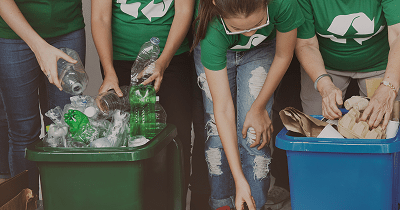
Buy loose, fresh fruit and vegetables
Claire Miller is Marketing Assistant at Wilshee’s, a waste and recycling company based in the East Midlands. She said to “avoid buying bagged-up produce wherever possible, as many of these plastics aren’t recyclable. We recommend natural cotton bags or mesh bags, which are cheap and washable, but there are many other options available.” You should also consider buying fresh and freezing it yourself. “Frozen foods tend to come in packaging tainted with plastic – even the cardboard boxes. By minimising your frozen food intake, you’ll improve both your diet and your waste reduction.”
Substitute kitchen storage items
Claire also suggests substitute products for storing food in the kitchen. “Swap out single-use plastic sandwich bags for something like beeswax wraps, and stretchy silicone lids instead of cling film. Keep an eye out for products with alternative packaging, such as laundry detergent in cardboard boxes and cartons of juice rather than plastic bottles.”
Make your own cleaning products
Claire also says you can make your cleaning products using ingredients from your kitchen, such as vinegar, baking soda, and lemon juice. “This can be just as effective as shop-bought cleaners, but without the constant plastic bottle-buying. Try using a mixture of 1-part vinegar to 3-parts water for an all-purpose cleaner.”
Get into composting
Composting is a great way to reduce waste, but there are rules on what can and can’t be composted. It’s worth taking the time to learn the rules, as Claire says, “composting will decrease the amount of bin bags you need, and how much food you throw away. You may be surprised just how much you can compost.”
Change the way you wash
Another easy way to ditch plastic is to swap out plastic-heavy products in the bathroom. Claire says that you’ll decrease your plastic consumption and be more hygienic in the process. “Use natural washcloths instead of synthetic creations like body pouffes, as these retain more germs, even when washed. Washcloths can be machine washed and reused for long periods. Bar soap is also more hygienic than shared hand pump soap and should use minimal plastic packaging.”
Get a reusable water bottle – without a filter
An easy way to cut down on plastic is to invest in a stainless steel or glass bottle. Remember that water filters are still plastic-heavy. Claire says “Buying a water filter will forever change your water consumption at home, but be careful – the filters are also plastic and need to be replaced fairly regularly.”
Find your nearest refill shop
A refill shop stocks dry ingredients and cleaning products. It allows you to fill up your packaging with it, meaning you can bypass plastic packaging and pay for your goods by weight. Claire says this is a great way to reduce plastic in your home as “will save you getting through needless packaging and spray bottles.” Ecover has a handy tool for finding your nearest refill shop.
Check your rubbish bag
Plastic bin bags are terrible for the environment. David Ewart, Director at interior design company Pavilion Broadway says “Here is a frightening statistic for you – most biodegradable binbags will break down and decompose within 6 months, but a regular plastic bin bag can take over 100 years to fully break down. Biodegradable binbags are becoming more readily available in stores like LIDL and Tesco, and you can also order them online from many specialist retailers. Spending a few pennies extra on your day to day waste disposal can make your home much more eco-friendly and deliver that feelgood factor every time you take the trash out!”
Swap out sanitary products
Finally, when considering how to reduce plastic at home, we should consider sanitary products.
According to National Geographic, 5.8 billion tampons were sold in the U.S. in 2018, a third of the global total. Tampons usually come in a plastic wrapper, with a plastic applicator and string, which is strengthened with plastic. The plastic applicators and cotton part of the tampon usually can’t be recycled. Essentially, tampons have become plastic-centric products that live on for at least 500 years. The good news is that there are more sustainable alternative products. Menstrual cups are reusable and can be found online or in-stores. There’s now also period-proof underwear, like ModiBodi, which can be a total replacement for feminine hygiene products.